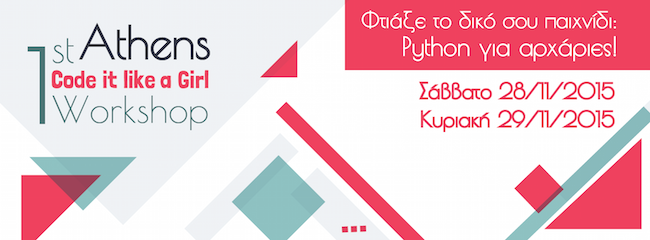1st Athens ‘Code it Like A Girl workshop’, 28-29th November

Did you know that the very first programmer was a woman? It’s true: before IT even existed, Ada Lovelace wrote math routines for the very first digital computer architecture.
Of course we managed to mess this up in the 20th century and the IT world got all male dominated.
Well it’s a new century now, and all this has started to change, with more women getting interested in a career in IT, starting tech-related startups, and learning to program. But still, women account only for 30% of IT employees in Europe and only 9% of application developers.
Policy changes and improvements in school curricula help, but what has been proven especially effective (and widely popular) worldwide are grass-roots groups and companies organizing workshops and coding sessions designed to introduce women of all ages and educational backgrounds to coding.
“Code it like a Girl” is one such initiative, a social cooperative enterprise aiming to “become a hub where women will come together, share ideas and use their technological skills for innovative problem-solving”.
The cooperative has already organized two successful workshops in Thessaloniki, and is having its first Athens workshop this weekend (28-29th November), which has already been “sold-out” (there will be more to come, though, so don’t despair).
The workshop will see the participants through building a simple computer game with Python, an easy to use programming language that’s popular for both educational and industry uses.
StartTech, a strong believer in gender equality in the workplace, welcomes the initiative and is a proud sponsor of the 1st Athens “Code it Like A Girl” workshop.
If you want to learn more about “Code it Like A Girl” and the upcoming workshop you can visit their website. Oh, and watch this space, as we’ll be back with a post-event interview with the organizers.
Go girls!
